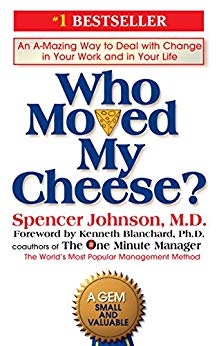

This article is an excerpt from the Shortform summary of "Who Moved My Cheese" by Spencer Johnson. Shortform has the world's best summaries of books you should be reading.
Like this article? Sign up for a free trial here .
When you experience change, is it distressing or rewarding? Do you tend to overanalyze?
Who Moved My Cheese? is a parable that demonstrates in practical terms how to handle change better and avoid pitfalls. You can do this by practicing a few key principles: anticipate and prepare for change, overcome fears, envision success, and enjoy change.
Continue reading for Who Moved My Cheese? discussion questions that will help you apply the book’s principles.
Who Moved My Cheese? Discussion Questions
By depicting simple, memorable characters and scenarios, the parable gives you a framework for responding to change successfully. Thinking it through helps even more. So, we’ve created 15 Who Moved My Cheese? discussion questions and organized them into six exercises for you to do alone or with a group.
Exercise #1: Reflect on the Story
This simple parable can give you insights into your own attitudes about change, which can help you be more successful in the future.
- Which character would you most prefer to be lost in a maze with, and why? (Sniff, Scurry, Hem, or Haw)
- What does cheese personally represent for you?
- Who or what controls your cheese? Who has the largest impact on the abundance or quality of your cheese?
Exercise #2: Prepare for Change
Change is natural. If you pay attention, you might detect the change coming long before it happens.
- Are there some signs of change in your workplace or personal life? What are they, and what change might be coming?
- What are some concrete steps you can take to prepare for this change?
Exercise #3: Picture Success
Picturing what success looks like, and imagining yourself succeeding, can help you get there.
- What would be your equivalent of sitting on a large pile of cheese? Picture your success in vivid detail – what does the world look like? What are you doing? How do you feel? How do others feel?
- What stepping stones can you put in place to get there?
Exercise #4: Overcome Fear
Even when you recognize that you must “move with the cheese,” it can be difficult to leave your comfort zone due to fear.
- When was a time you overcame your fear in the past? What was the result? How did your life improve (or not)?
- What lessons did you learn that you can apply to something you’re hesitant to do today?
- What would you do today if you weren’t afraid? Be bold.
Exercise #5: Avoid Overanalyzing
When we notice change occurring, we may waste time overanalyzing what’s already happened or what might happen, instead of simply taking action to move forward.
- Think about a time when overanalyzing held you back. How did you eventually move forward?
- What could have improved if you had acted earlier?
- Are you overanalyzing a situation today? What would you do if you stopped overanalyzing and did what you thought was best?
Exercise #6: Prepare for Continuous Change
If you expect change to happen, you’ll be better prepared when it does. Think about how to better prepare for changes.
- How could your company or organization better prepare for unexpected changes?
- How could you make yourself more resilient to future changes? This can be for your professional or personal life.
———End of Preview———

Like what you just read? Read the rest of the world's best summary of "Who Moved My Cheese" at Shortform . Learn the book's critical concepts in 20 minutes or less .
Here's what you'll find in our full Who Moved My Cheese summary :
- The absolute worst thing to do when change is coming
- How to adapt to change, like the key characters
- How to handle change in work and life






